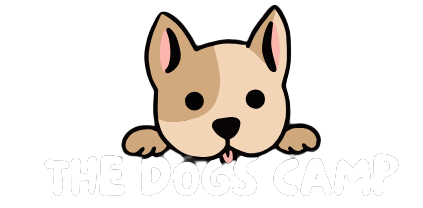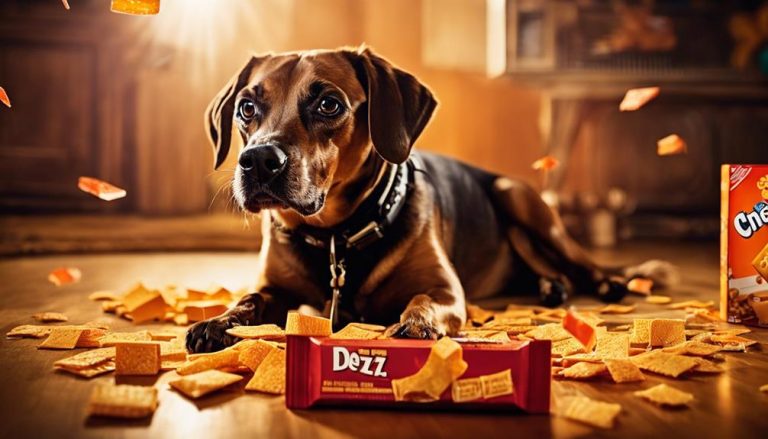Cheez-It: Safe for Dogs?
While tasty for humans, Cheez-Its are not a good snack for dogs. These snacks are high in salt and fats and contain artificial flavors like onion and garlic powders, which are unhealthy for your pet. Offering your dog Cheez-Its can lead to sodium poisoning, digestive problems, pancreatitis, and even obesity because these snacks provide no nutritional value for them. It’s best to avoid making Cheez-Its a regular treat for your dog.
Instead of giving them human snacks, look for treats made specifically for dogs. These are formulated to be both safe and nutritious for your pet. While a tiny amount of Cheez-Its might not cause immediate harm, it’s crucial to prioritize your dog’s health with better snack options. Remember, moderation and safety are essential when choosing treats for your furry companion.
Key Takeaways
- Cheez-Its carry risks like sodium toxicity for dogs.
- Some flavors may have onion and garlic, which are harmful to canines.
- It can lead to obesity and pancreatitis due to fat content.
Cheez-Its Ingredients Analysis
When looking into what goes into Cheez-Its, we find ingredients such as enriched flour, vegetable oil, cheese, and seasonings. These are typically okay for humans but pose concerns for dogs. Cheez-Its packs 150 calories, 8g of fat, 3g of protein, and 17g of carbohydrates per serving. However, dog owners should be cautious, especially with flavors containing onion and garlic powders. Even in small amounts, these can be harmful to dogs.
While not toxic, the main ingredients in Cheez-Its don’t offer much nutritional value for dogs. Dogs need diets rich in high-quality protein, vitamins, and minerals, which these crackers don’t provide. Dog owners must know what their pets eat and choose snacks that contribute to their well-being.
Health Risks for Dogs
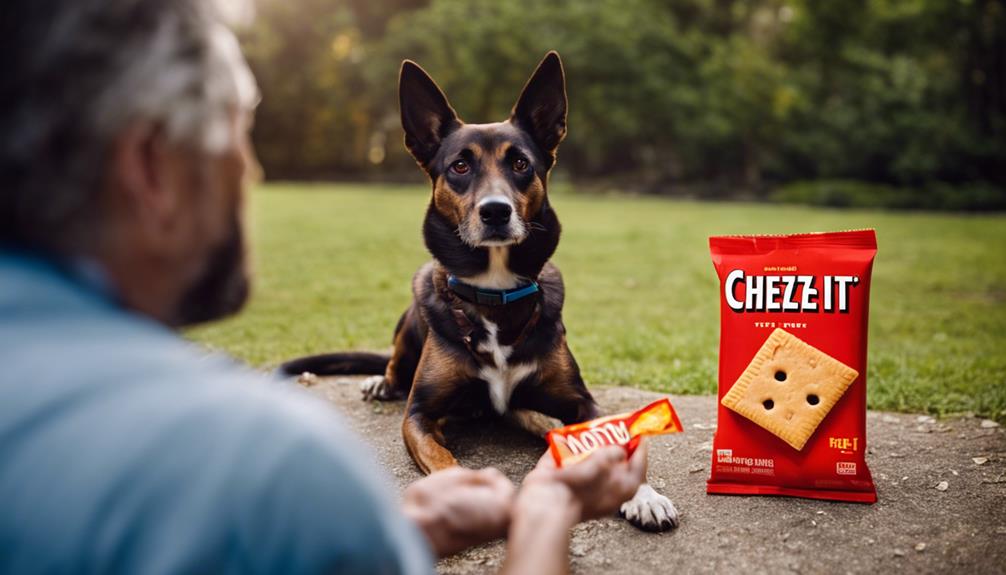
Considering your dog’s health when thinking about giving them Cheez-Its is crucial. These snacks have a high salt content, include artificial ingredients, and could lead to pancreatitis and obesity. These factors are critical when deciding on your pet’s diet.
Owners must know these risks to make intelligent choices for their dog’s health.
High Salt Content
The high salt content in snacks like Cheez-Its can be dangerous for dogs, leading to sodium toxicity if they overeat. Dogs are more sensitive to salt than people, so even a little bit can be bad for them. Eating too many salty snacks can dehydrate dogs and affect their electrolyte balance.
This is risky for dogs. If a dog gets salt poisoning, they might throw up, have diarrhea, act tired, and drink a lot of water. It’s best to keep dogs away from salty foods like Cheez-Its.
As dog owners, we need to know about the dangers of giving our pets human snacks that are high in salt to keep them healthy.
Artificial Ingredients Risk
Feeding Cheez-Its to dogs isn’t a good idea for two main reasons. High salt content is one worry, but artificial ingredients like onion and garlic powders are even more concerning. These additives can cause stomach issues and allergic reactions in dogs. Symptoms might include vomiting, diarrhea, or a lack of energy.
Moreover, Cheez-Its contain artificial flavors and colors, which could be harmful, especially to dogs with particular sensitivities. Owners should avoid giving their pets Cheez-Its to keep them healthy. It’s critical to choose safe and nutritious treats for our canine companions.
Pancreatitis and Obesity Concerns
Giving dogs treats like Cheez-Its can significantly increase their chances of facing health issues such as pancreatitis and obesity. These snacks are high in fat, which can lead to pancreatitis. This condition causes pancreas inflammation, leading to symptoms like tiredness, stomach pain, vomiting, and diarrhea. It’s a severe problem that needs fast veterinary care.
Feeding dogs foods that are high in calories regularly also causes them to gain too much weight. Obesity in dogs is a severe problem that can lead to more health issues. To keep dogs healthy, owners should avoid giving them high-fat foods. This helps prevent pancreatitis and obesity, ensuring dogs live a happy and healthy life.
Safe Serving Sizes
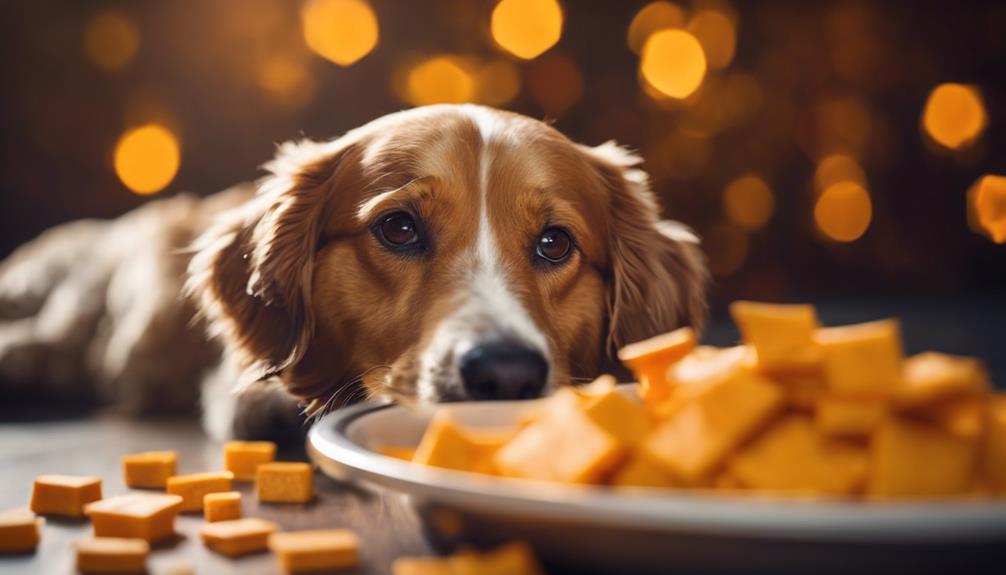
Knowing the right amount of Cheez-Its to feed your dog is crucial to avoid health issues. Experts suggest limiting the snack to 1-2 pieces per 10 pounds of your dog’s weight.
Cheez-Its aren’t poisonous to dogs in small amounts, but they’re far from the best treat option. Sticking to these serving guidelines helps prevent obesity, diabetes, and heart problems that can come from too many treats.
It’s also important to watch for allergic reactions after your dog eats Cheez-Its. Keeping Cheez-Its as an occasional treat within these limits ensures your pet can enjoy them safely without damaging health impacts.
Alternative Dog Treats
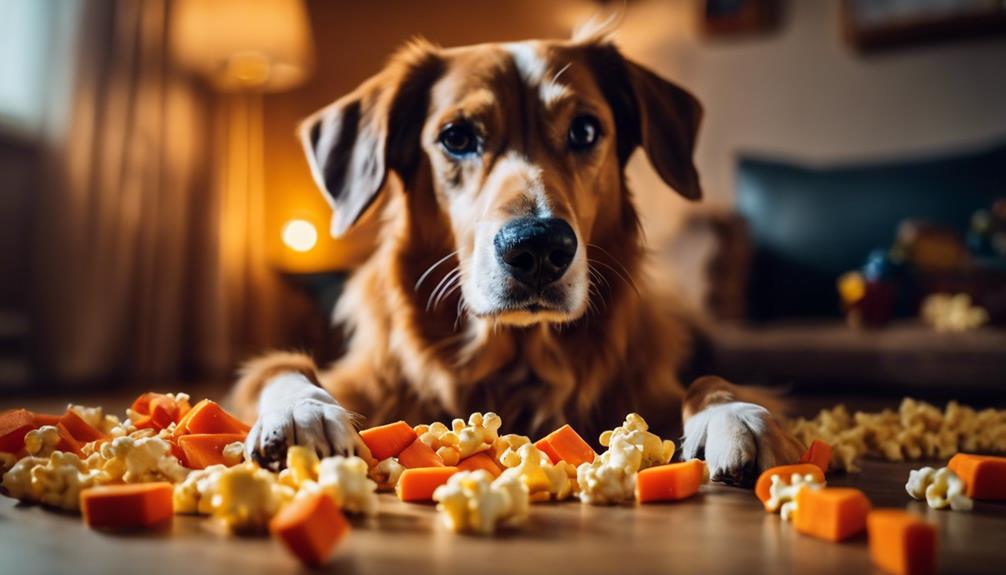
Consider giving them carrot sticks or slices instead of Cheez-Its to ensure your dog stays healthy and happy. Carrots don’t contain cheese cultures, whey protein, or wheat flour, making them a much safer option. Another great choice is apple slices (make sure they’re seedless to avoid risks). Apples are a sweet treat that’s also rich in fiber.
A fun, low-calorie snack for your dog can be plain, air-popped popcorn. It’s essential to avoid any added flavors or salt. Try giving your dog plain rice cakes for a simple and low-fat alternative. They’re easy on the stomach and don’t contain any harmful additives.
Making your dog treats at home can be a rewarding experience. It allows you to tailor the snacks to your dog’s dietary needs and preferences. You can avoid harmful ingredients like wheat flour and instead use dog-safe ingredients. This way, you ensure your pet gets the nutrients they need without any bad stuff.
Understanding Pancreatitis
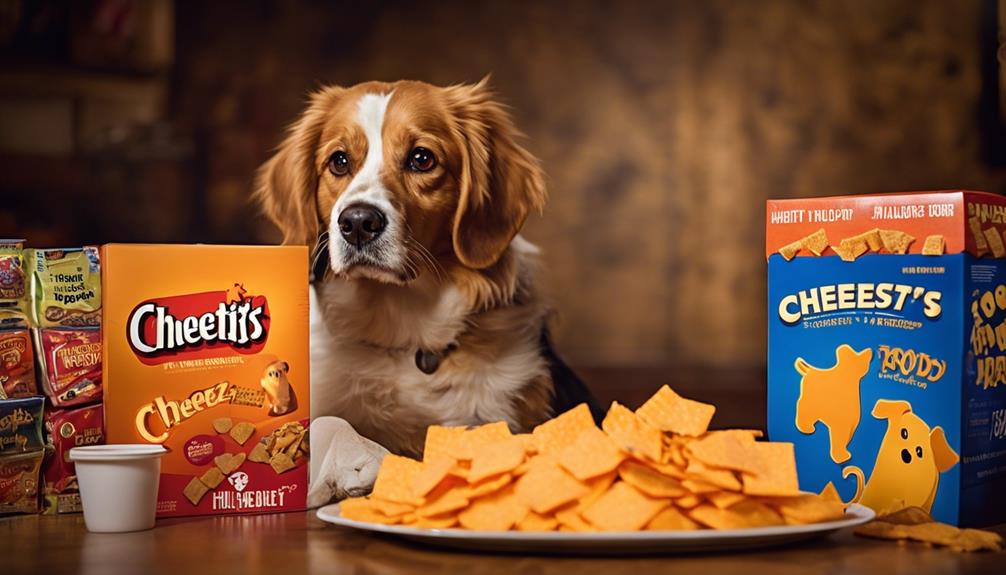
Pancreatitis is a severe health issue in dogs, marked by the swelling of the pancreas. It’s crucial to act quickly if your pet shows signs of this disease.
Eating foods high in fat, like Cheez-Its, might worsen or cause pancreatitis in dogs. Early detection is critical, so be alert for symptoms, including vomiting, diarrhea, and abdominal discomfort.
This condition demands prompt attention to prevent further complications.
Understanding what contributes to pancreatitis in dogs and how to spot the early signs ensures your pet gets the care they needs swiftly. Avoid feeding your dog high-fat foods, and watch for any distressing symptoms to help guard against this painful condition.
Pancreatitis Causes
Feeding your dog high-fat foods like Cheez-Its can be harmful. It might cause pancreatitis, a condition where the pancreas gets inflamed. This usually happens when dogs eat too many fatty foods. Cheez-Its, rich in fats, can easily lead to a health issue in dogs prone to it.
If your dog eats these snacks and then seems unwell, getting them to a vet is critical. Preventing pancreatitis is crucial, which means keeping your dog from snacks intended for humans. A balanced diet that avoids high-fat foods is the best way to keep your dog healthy and happy.
Symptoms in Dogs
Knowing how to spot the signs of pancreatitis in dogs is a must for pet owners, especially when their furry companions eat high-fat foods like Cheez-Its. Such foods can lead to pancreatitis, a condition that’s both painful and could be fatal if not treated in time. If your dog shows signs like tiredness, a swollen belly, pain in their abdomen, throwing up, or having diarrhea, it’s time to act fast. These symptoms point to a severe health problem that needs quick attention from a vet.
Due to their high-fat content, Cheez-Its are a known trigger for pancreatitis in dogs. If your pet has eaten many of these snacks, watching them closely for any of the mentioned symptoms is crucial. Getting your dog to a vet promptly can prevent the worsening condition, keeping your pet healthy and happy.
Vet-Recommended Snacks
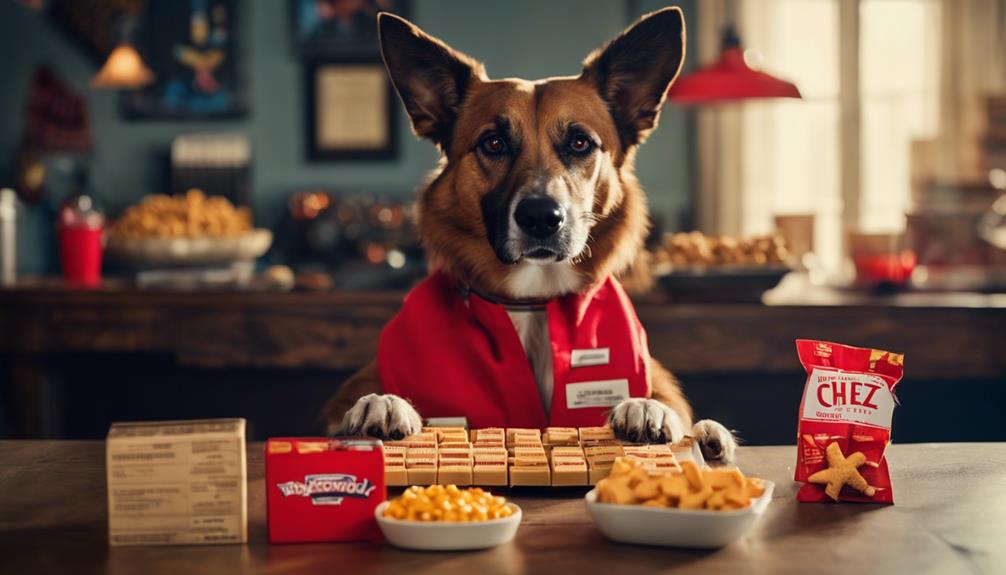
While Cheez-Its are best given in limited amounts, vets usually suggest healthier snacks like carrot sticks, apple slices, or plain rice cakes for dogs to ensure a well-rounded diet. An online vet consultation can offer tailored guidance on incorporating these nutritious options into your dog’s meals in moderation.
| Snack Option | Benefits | Serving Suggestion |
|---|---|---|
| Carrot Sticks | Low in calories, high in fiber | 2-3 small sticks |
| Apple Slices | Rich in vitamins, low in fat | 1-2 thin slices |
| Plain Rice Cakes | Low calorie, gentle for sensitive stomachs | 1/4 cake |
| Cucumber Slices | Hydrating, low in calories | 2-3 thin slices |
| Pumpkin Puree | High in fiber, it aids digestion | 1-2 tablespoons |
It’s crucial to limit snacks to maintain your dog’s dietary health.
Summary of Findings
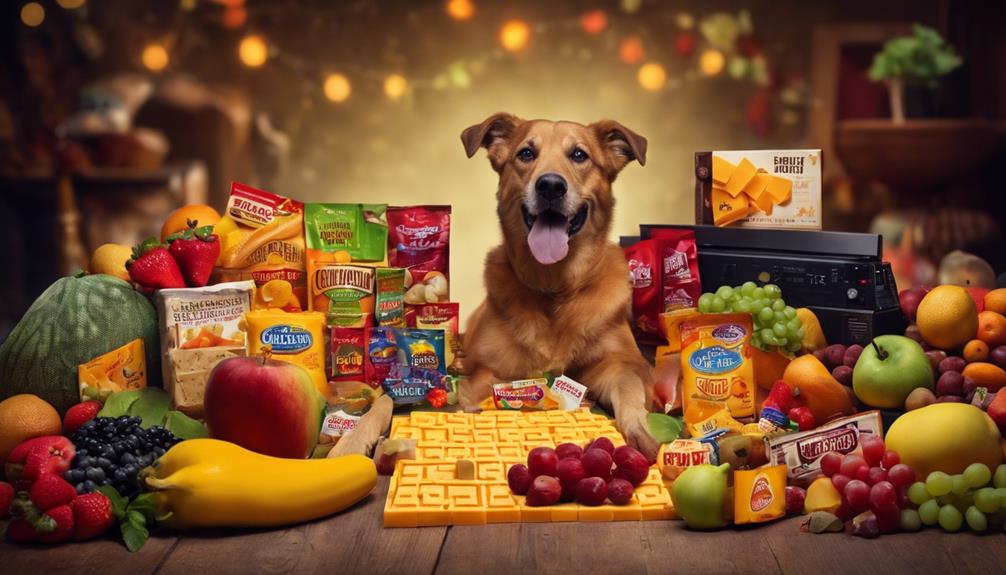
The research on Cheez-Its as a dog snack choice indicates that these treats, while loved by humans, are not the best for our canine companions. Eating Cheez-Its can lead to health issues in dogs due to their high salt content, which may cause high blood pressure. The dairy in these snacks and their calorie-rich nature could also result in obesity and digestive problems.
Worryingly, certain Cheez-It flavors contain onion and garlic powders, which are harmful to dogs and potentially lead to severe health complications. Thus, giving Cheez-Its to dogs should be an infrequent treat in minimal amounts rather than a diet staple. Pet owners should consider making healthy, dog-friendly snacks at home as a safer alternative.
Frequently Asked Questions
Are Any Cheeses Toxic to Dogs?
- Avoid blue cheese; it’s harmful due to mold.
- Dogs with allergies should skip all cheese types.
- Cottage cheese and mozzarella are safer choices for dogs.
Is It Safe to Eat Cheez-Its?
- Cheez-Its are safe, but avoid overeating.
- High sodium can lead to health problems.
- Enjoy in moderation for a balanced diet.
What Human Foods Can I Feed My Dog?
- Peanut butter is a safe, nutritious dog treat.
- Cooked chicken offers dogs a healthy protein boost.
- Carrots make great low-calorie snacks for dogs.
Can Dogs Eat Goldfish Crackers?
- Goldfish crackers are bad for dogs due to salt.
- Choose carrots for a healthier snack option.
- Portion control helps avoid dog health issues.
